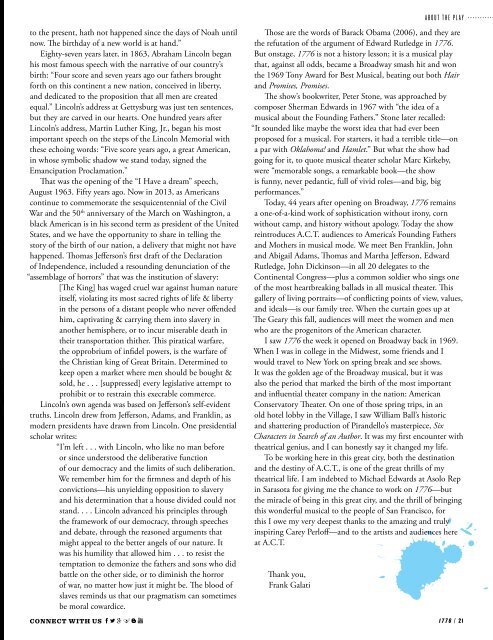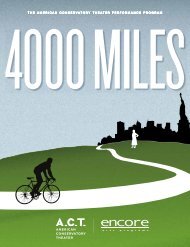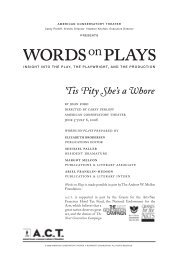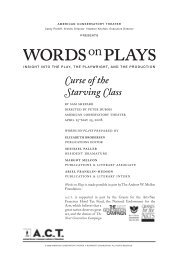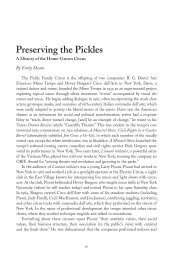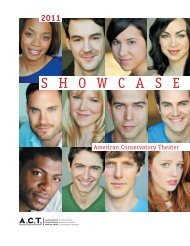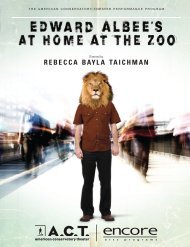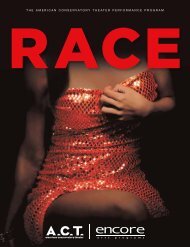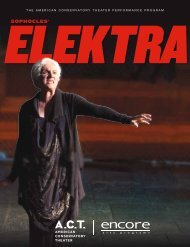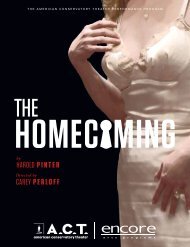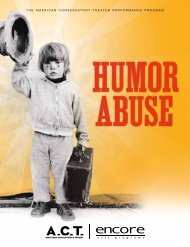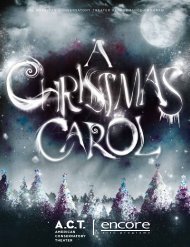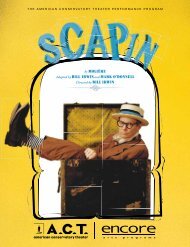SEP/OCT 2013 - American Conservatory Theater
SEP/OCT 2013 - American Conservatory Theater
SEP/OCT 2013 - American Conservatory Theater
Create successful ePaper yourself
Turn your PDF publications into a flip-book with our unique Google optimized e-Paper software.
to the present, hath not happened since the days of Noah until<br />
now. The birthday of a new world is at hand.”<br />
Eighty-seven years later, in 1863, Abraham Lincoln began<br />
his most famous speech with the narrative of our country’s<br />
birth: “Four score and seven years ago our fathers brought<br />
forth on this continent a new nation, conceived in liberty,<br />
and dedicated to the proposition that all men are created<br />
equal.” Lincoln’s address at Gettysburg was just ten sentences,<br />
but they are carved in our hearts. One hundred years after<br />
Lincoln’s address, Martin Luther King, Jr., began his most<br />
important speech on the steps of the Lincoln Memorial with<br />
these echoing words: “Five score years ago, a great <strong>American</strong>,<br />
in whose symbolic shadow we stand today, signed the<br />
Emancipation Proclamation.”<br />
That was the opening of the “I Have a dream” speech,<br />
August 1963. Fifty years ago. Now in <strong>2013</strong>, as <strong>American</strong>s<br />
continue to commemorate the sesquicentennial of the Civil<br />
War and the 50 th anniversary of the March on Washington, a<br />
black <strong>American</strong> is in his second term as president of the United<br />
States, and we have the opportunity to share in telling the<br />
story of the birth of our nation, a delivery that might not have<br />
happened. Thomas Jefferson’s first draft of the Declaration<br />
of Independence, included a resounding denunciation of the<br />
“assemblage of horrors” that was the institution of slavery:<br />
[The King] has waged cruel war against human nature<br />
itself, violating its most sacred rights of life & liberty<br />
in the persons of a distant people who never offended<br />
him, captivating & carrying them into slavery in<br />
another hemisphere, or to incur miserable death in<br />
their transportation thither. This piratical warfare,<br />
the opprobrium of infidel powers, is the warfare of<br />
the Christian king of Great Britain. Determined to<br />
keep open a market where men should be bought &<br />
sold, he . . . [suppressed] every legislative attempt to<br />
prohibit or to restrain this execrable commerce.<br />
Lincoln’s own agenda was based on Jefferson’s self-evident<br />
truths. Lincoln drew from Jefferson, Adams, and Franklin, as<br />
modern presidents have drawn from Lincoln. One presidential<br />
scholar writes:<br />
“I’m left . . . with Lincoln, who like no man before<br />
or since understood the deliberative function<br />
of our democracy and the limits of such deliberation.<br />
We remember him for the firmness and depth of his<br />
convictions—his unyielding opposition to slavery<br />
and his determination that a house divided could not<br />
stand. . . . Lincoln advanced his principles through<br />
the framework of our democracy, through speeches<br />
and debate, through the reasoned arguments that<br />
might appeal to the better angels of our nature. It<br />
was his humility that allowed him . . . to resist the<br />
temptation to demonize the fathers and sons who did<br />
battle on the other side, or to diminish the horror<br />
of war, no matter how just it might be. The blood of<br />
slaves reminds us that our pragmatism can sometimes<br />
be moral cowardice.<br />
ABOUT THE PLAY<br />
Those are the words of Barack Obama (2006), and they are<br />
the refutation of the argument of Edward Rutledge in 1776.<br />
But onstage, 1776 is not a history lesson; it is a musical play<br />
that, against all odds, became a Broadway smash hit and won<br />
the 1969 Tony Award for Best Musical, beating out both Hair<br />
and Promises, Promises.<br />
The show’s bookwriter, Peter Stone, was approached by<br />
composer Sherman Edwards in 1967 with “the idea of a<br />
musical about the Founding Fathers.” Stone later recalled:<br />
“It sounded like maybe the worst idea that had ever been<br />
proposed for a musical. For starters, it had a terrible title—on<br />
a par with Oklahoma! and Hamlet.” But what the show had<br />
going for it, to quote musical theater scholar Marc Kirkeby,<br />
were “memorable songs, a remarkable book—the show<br />
is funny, never pedantic, full of vivid roles—and big, big<br />
performances.”<br />
Today, 44 years after opening on Broadway, 1776 remains<br />
a one-of-a-kind work of sophistication without irony, corn<br />
without camp, and history without apology. Today the show<br />
reintroduces A.C.T. audiences to America’s Founding Fathers<br />
and Mothers in musical mode. We meet Ben Franklin, John<br />
and Abigail Adams, Thomas and Martha Jefferson, Edward<br />
Rutledge, John Dickinson—in all 20 delegates to the<br />
Continental Congress—plus a common soldier who sings one<br />
of the most heartbreaking ballads in all musical theater. This<br />
gallery of living portraits—of conflicting points of view, values,<br />
and ideals—is our family tree. When the curtain goes up at<br />
The Geary this fall, audiences will meet the women and men<br />
who are the progenitors of the <strong>American</strong> character.<br />
I saw 1776 the week it opened on Broadway back in 1969.<br />
When I was in college in the Midwest, some friends and I<br />
would travel to New York on spring break and see shows.<br />
It was the golden age of the Broadway musical, but it was<br />
also the period that marked the birth of the most important<br />
and influential theater company in the nation: <strong>American</strong><br />
<strong>Conservatory</strong> <strong>Theater</strong>. On one of those spring trips, in an<br />
old hotel lobby in the Village, I saw William Ball’s historic<br />
and shattering production of Pirandello’s masterpiece, Six<br />
Characters in Search of an Author. It was my first encounter with<br />
theatrical genius, and I can honestly say it changed my life.<br />
To be working here in this great city, both the destination<br />
and the destiny of A.C.T., is one of the great thrills of my<br />
theatrical life. I am indebted to Michael Edwards at Asolo Rep<br />
in Sarasota for giving me the chance to work on 1776—but<br />
the miracle of being in this great city, and the thrill of bringing<br />
this wonderful musical to the people of San Francisco, for<br />
this I owe my very deepest thanks to the amazing and truly<br />
inspiring Carey Perloff—and to the artists and audiences here<br />
at A.C.T.<br />
Thank you,<br />
Frank Galati<br />
CONNECT WITH US 1776 / 21


